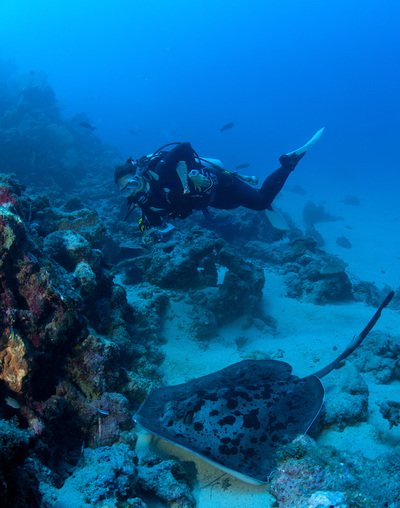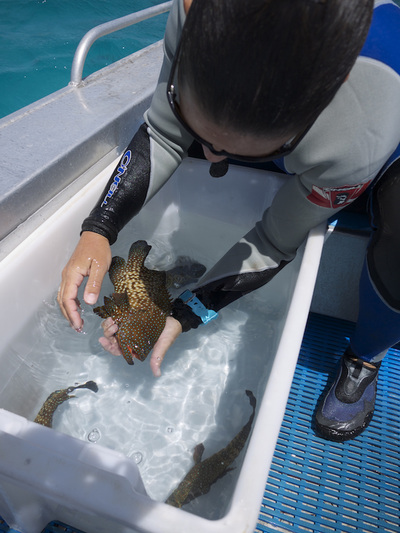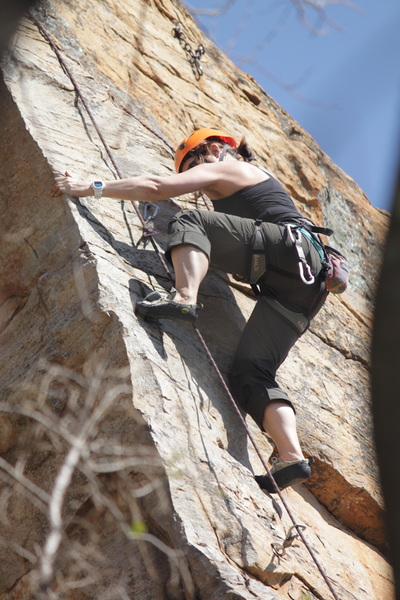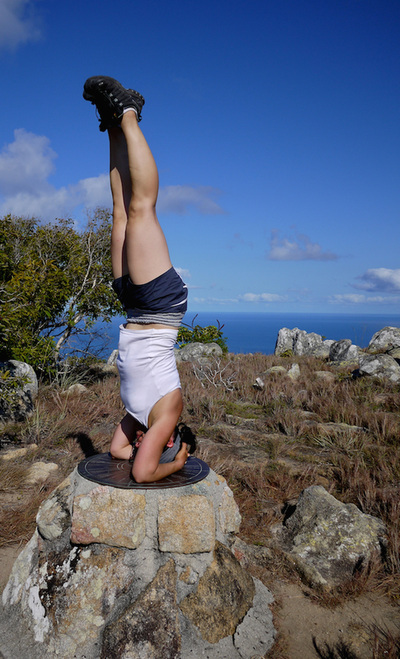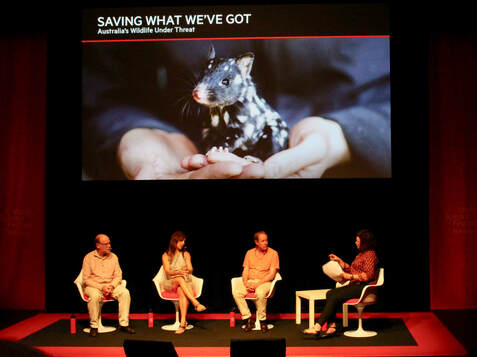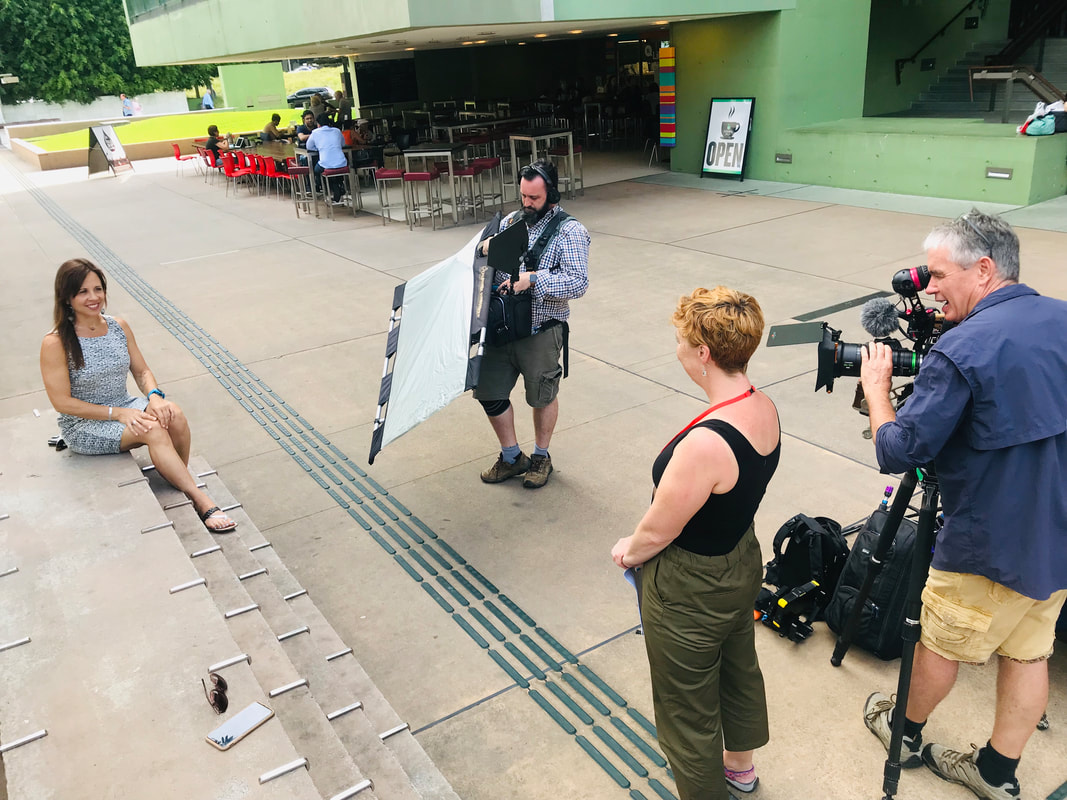About Me
Dr. Rummer is currently a Professor of Marine Biology in the College of Science and Engineering and formally the Australian Research Council (ARC) Centre of Excellence for Coral Reef Studies at James Cook University. Over the course of her career, Jodie has researched fish buoyancy, exercise, and is a leading authority on the evolution of oxygen transport and how performance is maintained during stress. Today, Jodie’s team continues to combine ecology, evolution, and physiology to address issues important to conservation, such as the effects of climate change and other human-caused problems on coral reef fishes, sharks, and rays and the potential for adaptation.
In 2011, Dr. Rummer was awarded an Australian Research Council (ARC) “Super Science Fellowship”. Then, between 2015 and 2017, she held an ARC Early Career Discovery Fellowship (DECRA) and was soon promoted to Associate Professor and then to full Professor 1 July 2022. Jodie currently works from several other research grants with her students and collaborators.
Prior to joining JCU in August 2011, Jodie's academic training started in the U.S. (BSc and MSc degrees, both from the University of West Florida). She then moved to Canada where she earned her PhD from the University of British Columbia in Vancouver under the supervision of Prof. Colin Brauner. There, she focused on the evolution of oxygen uptake and delivery in fishes and the mechanisms used to maintain performance during stress. Jodie then moved to Hong Kong for a short post-doctoral fellowship where she worked with Prof. David J. Randall (emeritus, UBC) investigating the role of secondary circulatory systems during stress in fish.
Dr. Rummer has and array of accolades and has been awarded for her research as well as her capacity to communicate and connect her findings to broad and diverse audiences. She is also on the editorial board for three scientific journals and part of the UNESCO Intergovernmental Oceanographic Committee (IOC) advisory panel on global deoxygenation (Global Oxygen Network, GO2NE), which is part of the United Nations Decade of Ocean Science for Sustainable Development program.
In 2015, she received the highly prestigious UNESCO-L’Oréal Women in Science Fellowship for Australia and New Zealand and gave a TEDx talk, “Athletes of the Great Barrier Reef”.
In 2016, Jodie was named one of Australia’s top 5 scientists under the age of 40 by the Australian Broadcasting Corporation (ABC) and Radio National (RN) and was awarded the Society for Experimental Biology’s President’s Medal.
Jodie gave the President’s lecture at the New England Aquarium in Boston and was an invited speaker at the Gills Club Symposium “Shark Tales: Women Making Waves” and educational outreach day, both in 2017.
In 2018, Jodie and her team, through the work of Tom Vierus, produced a 9 minute documentary covering their shark research in French Polynesia, which debuted at the New York City Wildlife Conservation Film Festival and three other Film Festivals so far (with >4.6K views on Facebook, and Vimeo, 15,946 impressions, and >1300 engagements) as well as two short videos (check them out here and here. Over the past year, Jodie has also discussed their shark research on National Geographic Wild (aired September 2018), on Ocean Treks with Jeff Corwin (filmed Oct. 2018, aired March 2019), and on Discovery Canada (see Twitter and Facebook for short clips).
In 2019, Dr Rummer was invited to speak at the Museu do Amanhã (Museum of Tomorrow, Rio de Janeiro, Brazil) as part of the United Nations Sustainable Development Goals – Agenda for Sustainable Development for 2030 – #14 “Life Below Water”. She also gave a Planet Talk at WOMADelaide, attended by over 100,000 people, regarding the harmful effects of oil drilling and pollution on marine life. It was featured in short documentary called Wild Waters and covered by the Adelaide Review and the ABC. Jodie also spoke at sold-out events at the 2019 World Science Festival in Brisbane on “Saving what we’ve got: Australia’s wildlife under threat” and “Let’s talk: Sharks”, reaching audiences exceeding 100,000. Later in 2019, she was honoured as Queensland’s Tall Poppy Outstanding Early Career Researcher Scientist of the Year.
In 2021, Dr Rummer organized the UNESCO Intergovernmental Oceanographic Commission (IOC) Global Ocean Oxygen Network (GO2NE) webinar series “Global deoxygenation across scales”. Also in 2021 and 2022, she was selected to represent Marine Biology – “Marine Biology in the Tropics – Amazing Aquatic Athletes in a Changing World” – in Australia for the Australian Trade and Investment Commission (Austrade) Times Higher Education (THE) Study Australia Masterclass Series, which reached >1,600 students live in South Asia and generated 13 million impressions via the marketing campaign. Jodie also spoke on “What can the toughest shark on the Great Barrier Reef teach us about climate change” in the 2021 Global Biodiversity Festival, which was sponsored by National Geographic, the International Union for the Conservation of Nature (IUCN), and Lenovo, among others.
Jodie has an h-index of 37, has published 107 peer-reviewed journal articles, 13 book chapters, 8 conference proceedings, 21 editorial commentaries, and has presented her work at more than 120 professional conferences and public events. She also uses social media to communicate scientific findings, highlight fellow scientists’ success stories and achievements, and to advocate for issues related to women in science, gender balance, and diversity in STEM.
In 2015, she received the highly prestigious UNESCO-L’Oréal Women in Science Fellowship for Australia and New Zealand and gave a TEDx talk, “Athletes of the Great Barrier Reef”.
In 2016, Jodie was named one of Australia’s top 5 scientists under the age of 40 by the Australian Broadcasting Corporation (ABC) and Radio National (RN) and was awarded the Society for Experimental Biology’s President’s Medal.
Jodie gave the President’s lecture at the New England Aquarium in Boston and was an invited speaker at the Gills Club Symposium “Shark Tales: Women Making Waves” and educational outreach day, both in 2017.
In 2018, Jodie and her team, through the work of Tom Vierus, produced a 9 minute documentary covering their shark research in French Polynesia, which debuted at the New York City Wildlife Conservation Film Festival and three other Film Festivals so far (with >4.6K views on Facebook, and Vimeo, 15,946 impressions, and >1300 engagements) as well as two short videos (check them out here and here. Over the past year, Jodie has also discussed their shark research on National Geographic Wild (aired September 2018), on Ocean Treks with Jeff Corwin (filmed Oct. 2018, aired March 2019), and on Discovery Canada (see Twitter and Facebook for short clips).
In 2019, Dr Rummer was invited to speak at the Museu do Amanhã (Museum of Tomorrow, Rio de Janeiro, Brazil) as part of the United Nations Sustainable Development Goals – Agenda for Sustainable Development for 2030 – #14 “Life Below Water”. She also gave a Planet Talk at WOMADelaide, attended by over 100,000 people, regarding the harmful effects of oil drilling and pollution on marine life. It was featured in short documentary called Wild Waters and covered by the Adelaide Review and the ABC. Jodie also spoke at sold-out events at the 2019 World Science Festival in Brisbane on “Saving what we’ve got: Australia’s wildlife under threat” and “Let’s talk: Sharks”, reaching audiences exceeding 100,000. Later in 2019, she was honoured as Queensland’s Tall Poppy Outstanding Early Career Researcher Scientist of the Year.
In 2021, Dr Rummer organized the UNESCO Intergovernmental Oceanographic Commission (IOC) Global Ocean Oxygen Network (GO2NE) webinar series “Global deoxygenation across scales”. Also in 2021 and 2022, she was selected to represent Marine Biology – “Marine Biology in the Tropics – Amazing Aquatic Athletes in a Changing World” – in Australia for the Australian Trade and Investment Commission (Austrade) Times Higher Education (THE) Study Australia Masterclass Series, which reached >1,600 students live in South Asia and generated 13 million impressions via the marketing campaign. Jodie also spoke on “What can the toughest shark on the Great Barrier Reef teach us about climate change” in the 2021 Global Biodiversity Festival, which was sponsored by National Geographic, the International Union for the Conservation of Nature (IUCN), and Lenovo, among others.
Jodie has an h-index of 37, has published 107 peer-reviewed journal articles, 13 book chapters, 8 conference proceedings, 21 editorial commentaries, and has presented her work at more than 120 professional conferences and public events. She also uses social media to communicate scientific findings, highlight fellow scientists’ success stories and achievements, and to advocate for issues related to women in science, gender balance, and diversity in STEM.
